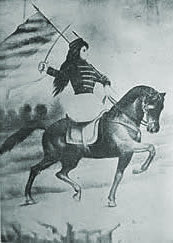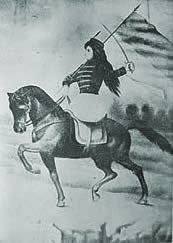
|
Women and Independence in Latin America An exploration of women's involvement in the Latin American Wars of Independence |

|

|
Women and Independence in Latin America An exploration of women's involvement in the Latin American Wars of Independence |

|
Click on one of the images below to see the full-size image
 Buenos Aires, 1834 |
 Juan María Gutiérrez |
 Juan María Gutiérrez |
Gender:Male
Ethnic origen: White
Events:
| 1809 | - | Buenos Aires | - | Not applicable | - | May 6, 1809 |
| 1837 | - | Buenos Aires | - | Unknown | - | He co-founded the Salón de '37 in Buenos Aires. |
| 1840 | - | Montevideo | - | Unknown | - | He was in exile here. |
| 1840-1852? | - | Chile | - | Unknown | - | He was in exile here. |
| 1840-1852? | - | Peru | - | Unknown | - | He was in exile here. |
| 1878 | - | Buenos Aires | - | Unknown | - | He died on 26 February 1878. |
Connections:
Argentine exiles in ChileBiography:
Born in 1809, he was a member of the “Generation of 37”, who were united in their opposition to Rosas. An opposition that, according to Katra was linked to racial superiority typical of their class at that time: Rosas’s popularity among the mestizos, pardos and blacks was seen as distasteful, the barbarian element that kept him in power. This was not a major cause, but had an impact on their attitude towards Rosas. (Katra, 30.)
In 1837 he, together with Sastre and Alberdi, founded the Salón del ’37, a Buenos Aires based salón literario. This was also known as Marcos Sastre’s Salón Literario. It was composed of a group of young intellectuals who were dissatisfied with Rosas’s infiltration/ control of the University. They met in Sastre's library to design a project of national conscience and liberal reforms to bring about Rosas’s downfall. It had about 50 members, among them Vicente López, and Esteban Echeverría. They also devised the cultural programme implemented by Sarmiento. (Denegri, 120.) It lasted only for a few months due to Sastre’s approval of Rosas for having brought order and peace to Argentina. (Katra, 48.)
He was a member of the Asociación de Mayo. He was imprisoned for three months by Rosas and then sent into exile in Montevideo, Chile and Peru. He published articles in newspapers in all these countries. (Coester, 123-124)
He died in 1878.
References:
Anderson Imbert, Enrique (1954) Historia de la literatura hispanoamericana, Tomo I, La Colonia cien años de República
Denegri, Francesca (1996) El Abanico y la Cigarerra: La primera generación de mujeres ilustradas en el Perú, 1860-1895
Katre, William H. (1996) The Argentine Generation of 37, Echeverría, Alberdi, Sarmiento, Mitre